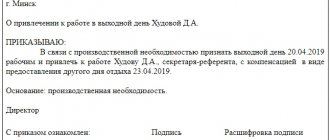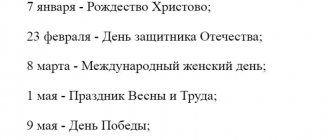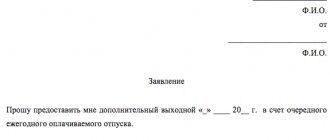Article 113 of the Labor Code of the Russian Federation simultaneously prohibits employers from engaging their employees to perform certain work on holidays and weekends and determines the procedure and grounds for legally engaging employees to work on these days.
Labor Code of the Russian Federation
dated December 30, 2001 N 197-FZ
Full text of the article, guides, additional information - in ConsultantPlus
Provisions of Art. 113 Labor Code
Article 113 of the Labor Code of Russia defines the main provisions regarding the call of personnel during non-working hours or weekends. Despite the fact that it directly states the prohibition, there are also exceptional cases when this is permitted with the consent of the employee or in case of urgent production needs. The rule applies to all areas of activity, without exception.
All companies operating in the market are required to follow this article. Calls overtime are carried out as a result of the need to provide services to the population, absence of employees on the night shift, carrying out repairs or loading or unloading operations.
If the employer does not have the consent of the staff to work on days off, this will be a direct violation of the norms of the Labor Code of the Russian Federation. A citizen can protect his rights by appealing to the labor inspectorate or court.
Prohibition of going to work on weekends and non-working days
Article 113 of the Labor Code of the Russian Federation contains a direct indication of the inadmissibility of attracting personnel to work on working days or holidays, unless the situation is an exception provided for by current legislation. The presence of written consent and extreme necessity is the main condition that is checked during a scheduled inspection by the labor inspectorate. If one of them is missing, this is considered a violation of the established norm of the law. Exceptions when a company has the right to call personnel without their consent are provided for by the Labor Code, namely Art. 113, are the following situations:
- It is necessary to eliminate the consequences of a disaster, natural disaster or accident that occurred at work.
- There is a possibility of destruction or damage to property of the company or that belonging to the municipality or government agencies.
- Work related to the introduction of a state of emergency.
- The need to eliminate a fire, flood, earthquake or other circumstances that threaten the safety, life or health of the population.
Employees are called, even if there is a threat of the listed circumstances occurring. If a person is already in place, he remains to work overtime. There is no requirement to obtain consent for people in creative professions, for example, those involved in filming films, members of theater groups, circuses, etc. Their working conditions are specified in the general contract.
Procedure for calling to work on days off
Art. 113 of the Labor Code of the Russian Federation stipulates the need to obtain the written consent of the employee as the main condition for attracting him to work. At the same time, it is also important to comply with the regulations established by law:
- Notifying personnel about the emergence of a production need to work at odd hours.
- Drawing up and signing an order, indicating all the persons who will be involved.
- Familiarization with the order against signature.
- Obtaining written consent from each employee.
- Notation on the report card and subsequent payment of compensation.
The notice is an official document that the company is required to register in a special journal. It is stored at the enterprise for 5 years, so non-compliance with this point is easily detected during a scheduled inspection by the labor inspectorate. If the employee refuses to get acquainted with the notice against signature, the personnel service must draw up a report.
It is important to know! Refusal to work on weekends, as defined by Article 113 of the Labor Code of the Russian Federation with comments, is the legal right of an employee. For this, the employer does not have the right to bring him to disciplinary liability. Even the moment whether a citizen has a normal working day or not is not taken into account.
Differentiation by employee categories
It is unacceptable to hire the following people to work on weekends and holidays:
- pregnant women;
- minor workers, with the exception of minor professional athletes or creative workers.
Only with written consent and a written explanation of their right to refuse to go to work is it permitted to hire:
- disabled workers;
- female workers with children under 3 years of age, including adopted ones;
- workers and workers raising children under 5 years of age independently (without a second spouse);
- workers who independently care for disabled children or adult sick family members (if there is a medical certificate about the need for care).
Pay for work at odd hours
With a five-day week, there are two days off, and with a six-day week, one. Sunday is considered a general non-working day. In addition to it, there are also official holidays, for example, Victory Day, New Year, National Unity Day. If you are required to work on these days or overtime, additional compensation is implied. The size depends on the terms of payment for the work:
- Piecework – double the amount of the stipulated payment per hour.
- The salary is a single rate with the subsequent provision of a day for proper rest, subject to work in excess of the established monthly norm.
- Hourly - no less than double the tariff provided for such actions on ordinary days.
Attention! The procedure for payment and calculation of compensation is determined by the employment contract or collective agreement, and other regulations adopted by the enterprise. Even if a person did not work the whole day, he is given the full amount of time off, but payment can be made for the hours actually worked.
Features of attracting creative workers to work
Article 113 of the Labor Code of the Russian Federation provides an exhaustive list of workers whose professions are considered to be creative:
- media staff;
- television (cinema, television programs, video filming, etc.);
- music;
- theatrical performances;
- circus performances;
- writers;
- artists;
- etc. The full list can be found in government decree number 252 of April 28, 2007.
That is, these are people whose lives are in one way or another connected with creativity. This includes writers, screenwriters, actors, those who sing and those who write music. As well as journalists, videographers, directors, etc. Not only those who perform on stage, but also those who provide performances from behind the scenes. The work of this category of workers on weekends is contractual. To be more precise, the working conditions of creative workers are determined by the provisions of the labor/collective agreement and/or regulations adopted at the employer’s enterprise.
Pay system for non-working hours
According to Art. 153 of the Labor Code of the Russian Federation, wages for non-working hours should be no less than double material compensation.
For each category of workers, its own amount of compensation is determined:
- to piece workers at double the level;
- for workers who work at a daily or hourly rate of no less than double the amount;
- employees who work on a salary basis are entitled to compensation in the amount of at least one daily or hourly coefficient; more salary if they worked within the limits of the monthly level of work-hours, in the amount of a daily or hourly coefficient in double size, if the work performed as a result amounted to more than the monthly level of hours.
Legislation allows increasing the minimum wage for non-working hours. The specific salary for non-working hours can be determined by a collective agreement, internal regulations, or an employment agreement.
It is also possible to provide a day off at the request of the employee. The administration does not have the right to give him time off without an agreement with the worker. Performing functional duties during non-working hours is paid in a single amount, and a day off is provided.
Workers who receive wages in the form of a salary are paid for their time at the daily or hourly rate, unless the monthly level limit is too high. If the standard is higher, the payment will be compensated at double the amount.
An employee may request a day off from work in writing. The salary during the period when the leave was taken does not decrease, and it does not matter whether the worker uses it in the current month or the next. The procedure for providing additional compensation for overtime hours does not apply to workers who have an irregular day or schedule.
For some citizens, the remuneration system for non-working hours may be determined in a collective agreement, internal regulations, or labor agreement. This category includes persons in creative professions, media, cinematography, television filming, theater and concert organizations and other employees based on the list approved by Government Decree of the Government of the Russian Federation No. 252.
We recommend you study! Follow the link:
Labor Code on working time standards
In addition, Art. 290 of the Labor Code of the Russian Federation determines special conditions for calculating wages for non-working hours for seasonal and temporary workers. Compensation is provided only in material terms, there is no right to time off.
Warranty obligations of the administration in accordance with Art. 153 of the Labor Code of the Russian Federation applies to all workers, regardless of the schedule (five-day work, shift work, etc.).
At enterprises with a continuous technological process, cumulative work-hours are provided and special conditions apply, which are set out in the resolution of the State Labor Committee of the USSR, “On compensation for work on holidays.”
Labor activity is included in monthly accounting.
All workers are paid double the amount for actual time worked. If a part of the shift schedule falls on a holiday, then the time worked from 00.00 to 24 hours is paid.
If a worker worked on a holiday according to a shift schedule, then he is due an increased amount of payment, but the day off is not allocated, because the stipulated limit for the monthly level of work-hours has not been exceeded. If work activity exceeds the monthly norm, then the worker can count on a free day.
Involvement in work duties during non-working hours
Traditional days off are Saturday and Sunday. National holidays are listed in Art. 112 of the Labor Code of the Russian Federation: January 1-8, February 23, March 8, May 1 and 9, June 12 and November 4. However, in manufacturing enterprises where suspension of the work process is not allowed, a schedule is drawn up without taking such days into account.
Sometimes the manager may invite workers to perform work duties if there is a need for production activities. To call an employee to work, the administration is obliged to warn him in writing and obtain his approval or refusal.
Involvement in the production process is possible without agreement under certain conditions set out in Art. 113 of the Labor Code of the Russian Federation. The performance of labor duties occurs on the basis of an order from the administration, where the worker must sign.
You can be called to work on holidays and outside working hours without approval under the following circumstances:
- to eliminate an emergency or catastrophic situation and eliminate the results;
- when there is a danger of damage or loss of property of the enterprise;
- to carry out work that is associated with extreme situations or military operations;
- when there was a danger to the life and health of citizens;
- for urgent loading and unloading operations.
If there are no such circumstances, the administration has the right to invite workers to work outside working hours with their approval.
Articles 113 and 153 are closely related; the Labor Code guarantees payment for non-working time, as well as overtime at a double rate.
When performing work duties, an increased salary is paid for non-working time. A worker who worked on weekends or holidays may, if desired, be given another day off and compensated for work as usual.
Mothers with children under three years of age, as well as persons with limited physical functions, can work outside working hours, if this does not contradict an official medical opinion.
Special condition
In all cases, except those specified in parts three and four of Art. 113 of the Labor Code of the Russian Federation, written consent of employees is required. Additionally, the employer must take into account the opinion of representatives of the elected body of the trade union. As for the production activities specified in Part 6 of Art. 113 of the Labor Code of the Russian Federation, the norm does not contain a direct indication of the obligation to comply with the above instructions. Due to the fact that the list contains activities that are not of an exceptional nature, are not unforeseen, and their implementation relates to the normal conditions of the relevant enterprises (continuously operating, providing services to the population, emergency loading and unloading and repair operations), the involvement of personnel in them on holidays and weekends does not require compliance with these requirements.
Written consent
Article 113 of the Labor Code of the Russian Federation allows work on weekends and holidays with the written approval of the employee himself. There is no unified form of the document; the application is written in any form, but with reference to normal health.
Employees working in excess of legal labor standards is called overtime. To be involved in the labor process, an agreement between the employee and the trade union committee is required.
Without permission, you can attract on the basis of the conditions set out in Art. 113 Labor Code of the Russian Federation.
Minors, disabled people and pregnant women, as well as children under three years of age, are not called to work overtime.
The production document stipulates the circumstances of calling a certain employee to work. At the same time, the appeal must be justified and lawful.
Based on Part 8 of Art.
113 of the Labor Code of the Russian Federation are involved in performing labor duties during non-working hours on the basis of a written document. In the event of an emergency, they are summoned by verbal order from the manager before the order is issued.
The exit is noted in the time sheet or working time book.
The norm of the article defines when it is permissible to call workers to work during non-working hours:
- The first part prohibits working on non-working days and holidays.
- The second talks about non-standard situations that give the administration the right to call an employee after receiving his approval.
- The third gives the manager the right to invite subordinates during non-working hours.
- The fourth indicates that the work of persons in the creative process is carried out only on the basis of a collective agreement or labor agreement.
- The fifth lists categories of citizens who are invited outside working hours only with the permission of the trade union committee.
- The sixth provides for the performance of work by persons whose functional duties are necessary, for example, work in a production workshop during an emergency.
- The seventh guarantees the protection of the rights of persons with disabilities and women who have young children under three years of age;
- The eighth serves as the final one and provides for the administration’s obligation to issue an order, which should reflect the increased amount of payment.
Involvement outside working hours is illegal, and the manager cannot put pressure on workers. In this case, the approval of the employee himself is important.
There are categories of production activities where it is impossible to stop the technological process, for example, a steel plant. Organizations that provide services to citizens, gas enterprises, urgent loading and unloading operations.
Despite managers’ compliance with the law, situations arise in judicial practice when a disabled person is fired for not agreeing to work on a day off. The administration did not take into account the fact that the employee was disabled according to a medical certificate.
The employee was reinstated based on a court decision with financial compensation for the time of forced absence and compensation for moral damage.







